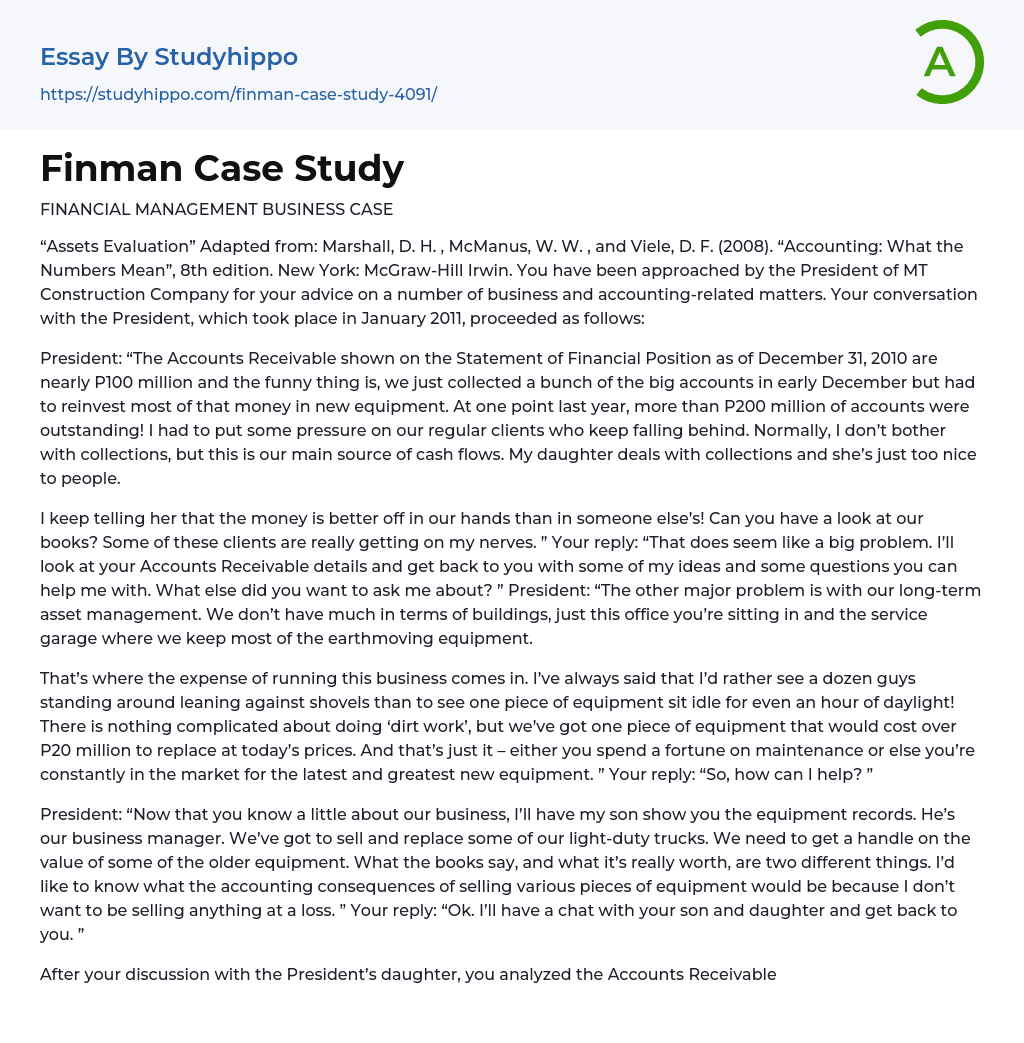FINANCIAL MANAGEMENT BUSINESS CASE
President:
- “The Accounts Receivable shown on the Statement of Financial Position as of December 31, 2010 are nearly P100 million and the funny thing is, we just collected a bunch of the big accounts in early December but had to reinvest most of that money in new equipment.
At one point last year, more than P200 million of accounts were outstanding! I had to put some pressure on our regular clients who keep falling behind. Normally, I don’t bother with collections, but this is our main source of cash flows. My daughter deals with collections and she’s just too nice to people.
I keep telling her that the money is better off in our hands than in someone else’s! Can you have a look at our books? Some of these clients ar
...e really getting on my nerves. ” Your reply: “That does seem like a big problem. I’ll look at your Accounts Receivable details and get back to you with some of my ideas and some questions you can help me with. What else did you want to ask me about? ” President: “The other major problem is with our long-term asset management. We don’t have much in terms of buildings, just this office you’re sitting in and the service garage where we keep most of the earthmoving equipment.
That’s where the expense of running this business comes in. I’ve always said that I’d rather see a dozen guys standing around leaning against shovels than to see one piece of equipment sit idle for even an hour of daylight! There is nothing complicated about doing ‘dirt work’, but we’ve got one piece of equipment tha
would cost over P20 million to replace at today’s prices. And that’s just it – either you spend a fortune on maintenance or else you’re constantly in the market for the latest and greatest new equipment. ” Your reply: “So, how can I help? ”
President: “Now that you know a little about our business, I’ll have my son show you the equipment records. He’s our business manager. We’ve got to sell and replace some of our light-duty trucks. We need to get a handle on the value of some of the older equipment. What the books say, and what it’s really worth, are two different things. I’d like to know what the accounting consequences of selling various pieces of equipment would be because I don’t want to be selling anything at a loss. ” Your reply: “Ok. I’ll have a chat with your son and daughter and get back to you. ”
After your discussion with the President’s daughter, you analyzed the Accounts Receivable details as of December 31, 2010, and prepared the following aging schedule:
You’ve noted that the company has not written-off any Accounts Receivable as uncollectible during the past several years. The Allowance for Bad Debts account is part of the Chart of Accounts, but has never been used. No cash discounts have been offered to customers, and the company does not employ a collection agency. Reminder invoices are sent to customers with outstanding balances at the end of every quarter.
After your discussion with the President’s son, you analyzed the 2010 equipment records related to the three items that the company wishes to sell at this time:
The President’s son explained that the company uses
the straight-line depreciation method. You have recalculated the annual depreciation adjustments through December 31, 2010, and are satisfied that the company has made the proper entries. The estimated market values were recently obtained through the services of a qualified, independent appraiser that you had recommended to the President’s son.
GUIDE QUESTIONS:
- Explain the President’s statement, “I keep telling her that the money is better off in our hands than in someone else’s! ”
- What is your overall reaction concerning the company’s management of Accounts Receivable? What suggestions would you make to the President that may prove helpful in the collection process?
- What accounting advice would you give concerning the Accounts Receivable balance of P98,000,000 at December 31, 2010?
- Explain the President’s statement, “We need to get a handle on the value of some of the older equipment. What the books say, and what it’s really worth, are two different things. ”
- Write the journal entries to show the effect of selling each of the three assets for their respective estimated market values.
- Explain to the President why the statement “I don’t want to be selling anything at a loss” does not make economic sense.
- Accountability essays
- Accounting Software essays
- Accounts Receivable essays
- Auditor's Report essays
- Balance Sheet essays
- Cash essays
- Cash Flow essays
- Costs essays
- Financial Audit essays
- Internal Control essays
- International Financial Reporting Standards essays
- Management Accounting essays
- Principal essays
- Tax essays
- Bank essays
- Banking essays
- Corporate Finance essays
- Credit Card essays
- Currency essays
- Debt essays
- Donation essays
- Enron Scandal essays
- Equity essays
- Financial Accounting essays
- Financial Crisis essays
- Financial News essays
- Financial Ratios essays
- Financial Services essays
- Forecasting essays
- Foreign Exchange Market essays
- Free Market essays
- Gold essays
- Investment essays
- Legacy essays
- Loan essays
- Market Segmentation essays
- Money essays
- Personal finance essays
- Purchasing essays
- Retirement essays
- Shareholder essays
- Stock Market essays
- Supply And Demand essays
- Venture Capital essays
- Academia essays
- Academic And Career Goals essays
- Academic Integrity essays
- Brainstorming essays
- Brown V Board of Education essays
- Brown Vs Board Of Education essays




